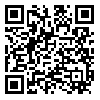Volume 13, Issue 4 (12-2015)
RBS 2015, 13(4): 538-548 |
Back to browse issues page
1- دانشيار، گروه روانشناسي، دانشکده علوم تربيتي و روانشناسي، دانشگاه تبريز، تبريز، ايران
2- دانشجوي دکتري، گروه روانشناسي، دانشکده علوم تربيتي و روانشناسي، دانشگاه تهران، تهران، ايران
3- دانشجوي دکتري، گروه روانشناسي، دانشکده علوم تربيتي و روانشناسي، دانشگاه تربيت مدرس، تهران، ايران
4- کارشناس ارشد، گروه روانشناسي باليني، دانشکده علوم تربيتي و روانشناسي، دانشگاه تبريز، تبريز، ايران
2- دانشجوي دکتري، گروه روانشناسي، دانشکده علوم تربيتي و روانشناسي، دانشگاه تهران، تهران، ايران
3- دانشجوي دکتري، گروه روانشناسي، دانشکده علوم تربيتي و روانشناسي، دانشگاه تربيت مدرس، تهران، ايران
4- کارشناس ارشد، گروه روانشناسي باليني، دانشکده علوم تربيتي و روانشناسي، دانشگاه تبريز، تبريز، ايران
Abstract: (2151 Views)
Aim and Background: The aim of the present study was to determine the effectiveness of transactional analysis based on motivational interviewing on patients with eating disorders. Methods and Materials: This quasi-experimental study was performed using a multiple baseline single case design. The study subjects consisted of 2 female clients of the psychological counseling unit of Imen Teb Zagros Center in Shiraz, Iran, in 2013. The participants were selected by purposive sampling method and underwent transactional analysis based on motivational interviewing. The subjects completed the Ahwaz Eating Disorder, Food Habits, Body Attitudes, Personality States, Interpersonal Relationships, and Self-esteem Questionnaires during pre-treatment (baseline) and at the third, eighth, fourteenth, nineteenth, and twenty-third sessions, and one-month follow-up. Moreover, their body mass index (BMI) was measured during the course of the treatment. Recovery percentage and the effect size were used for data analysis. For data analysis, percentage improvement and effect size index were used. Findings: The results showed that motivational interview-based transactional analysis was effective in curing patients with eating disorders and was been able to cause lasting and significant changes in all targets. At the end of the treatment and follow-up period, both participants demonstrated overall improvement in eating disorder (73%), eating habits (74%), body image (60%), interpersonal relationships (62%), self-esteem (54%), and personality states (76%). Conclusions: Transactional analysis based on motivational interviewing can be an effective treatment for patients with anorexia nervosa and bulimia nervosa.
Keywords: Eating disorders, Anorexia nervosa, Bulimia nervosa, Transactional analysis, Motivational interviewing
| Rights and permissions | |
 |
This work is licensed under a Creative Commons Attribution-NonCommercial 4.0 International License. |



